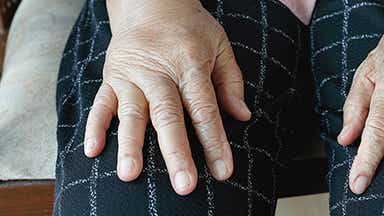What does PsA feel like?
What does PsA feel like?
PsA (psoriatic arthritis) is an inflammatory immune-mediated disease, but its effects can go far beyond that. As well as causing tiredness, pain, stiffness and swelling, you may find it difficult to sleep and notice nail changes or even redness and pain in your eyes. It’s also common for people with PsA to feel frustrated and unhappy, especially as you may find it harder to do simple things you took for granted. Social and psychological difficulties are common in people with PsA – you’re twice as likely to suffer from depression than if you have psoriasis alone. If you have PsA and are feeling low, whether or not this is because your symptoms aren’t under control, please speak to your doctor so that your physical or mental health, or both, can be treated.
TOP TIP
Use a backpack instead of a shoulder bag to spread the load.*
If you suffer from PsA, you may already know that it can appear to come and go. At times, your symptoms may seem under control, but at other times not as much. You may suffer mildly at one point, and severely at another. If you feel that your PsA isn’t under control, it’s important to speak to your healthcare professional – we’ve put together some tips to help you. If PsA isn’t properly treated it can lead to permanent joint damage, but your doctor is there to help you, and to make sure you’re on the right treatment for you.
Below, you’ll find the common symptoms of PsA, although not everyone has all of them – which do you recognise?

Swelling
- Swelling in fingers and toes

Pain and stiffness
- Pain and stiffness for most of the day
- Usually worse in the morning
- Discomfort at night

Tiredness
- Feeling more tired than usual

Nails
- A change in the way your nails look

Red, painful eyes
- Redness and pain in your eyes, a bit like ‘pinkeye’
Want to make the most of your doctor’s appointment?
If you are experiencing symptoms, or don’t feel that your treatment is controlling your PsA, please speak to your healthcare professional. Take a look at our helpful tips to help you have a productive conversation during your next appointment.You may be interested in

It can be easy to lose track of how you’re doing if you don’t take note.

Make every moment of the consultation really count.

Discover what your options might be.
